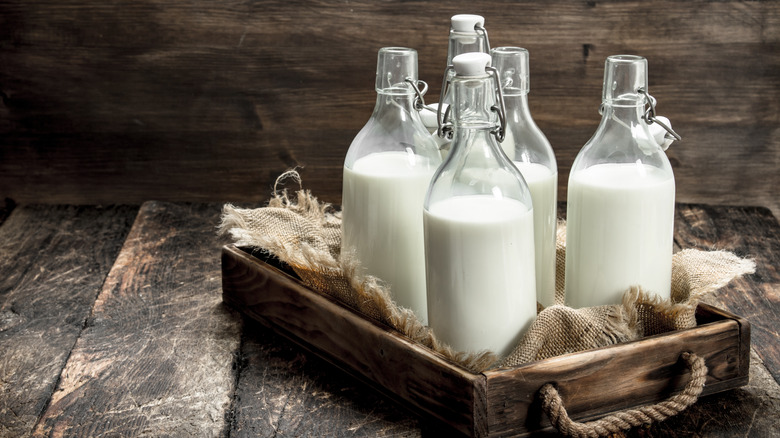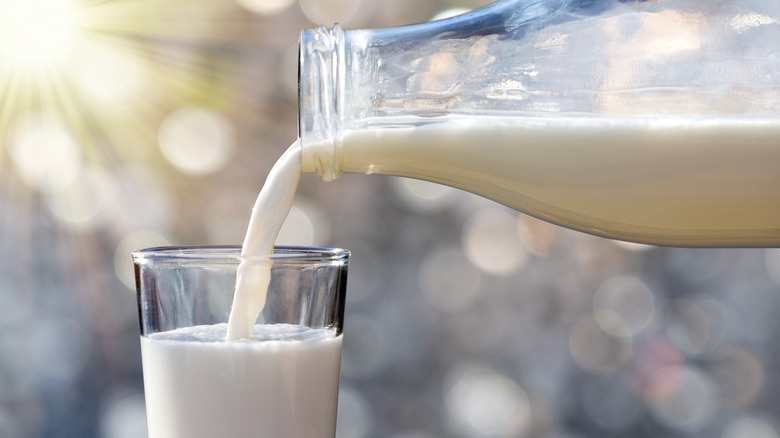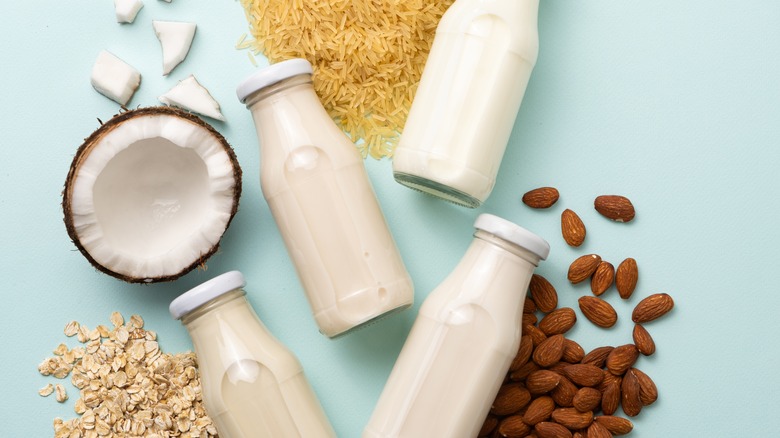Why Milk Has A Longer Shelf Life When Stored In Glass
The days of a hat-topped milkman dropping off a crate of glass milk bottles at your doorstep are long in the past, but it may be time to reconsider a resurgence of this nostalgic trend. As it turns out, your milk will stay fresher longer if stored in a glass bottle instead of a plastic jug or cardboard carton.
Bacteria is responsible for the spoilage of milk, and any exposure to oxygen, heat, or light can cause bacteria to proliferate. Once a container of milk is opened, the exposure to air ensues and the bacteria get busy multiplying. A cold, dark refrigerator takes care of any heat and light exposure, but a tight seal to the container is paramount to prolonging the shelf life of milk.
Glass bottles have a better, more airtight seal than their cardboard counterparts. Glass also stays colder outside of the fridge longer than plastic and cardboard do, making trips in-and-out of the refrigerator and to the dinner table and back less of a risk for bacteria-friendly warmer temperatures to build.
Other reasons to opt for glass milk bottles
A longer shelf life may be reason enough to consider transferring your milk to glass bottles, but there are a few other benefits that sweeten the deal.
For starters, in addition to being fresher, your milk will maintain a better flavor in a glass bottle (per a 2022 study in the Journal of Dairy Science). Plastic and cardboard are more porous than glass, allowing off-flavors to slip right through and alter the taste of the milk. This tends to be the case more so for skim milk than higher-fat varieties.
Environmental factors are also something to consider. While plastic is recyclable, glass milk bottles ultimately last longer as they are more durable. On average, they are reused 20 to 30 times before heading to recycling. Odds are, a plastic bottle wouldn't survive that many uses.
Last but not least, glass milk bottles may also offer a potential body benefit. Milk from plastic jugs has been shown to contain microplastics. Microplastics are tiny plastic particles that are shed when plastic bottles begin to degrade. The ingestion of microplastics is believed to be toxic, and minimizing exposure is recommended until more is known (via a 2020 study in the International Journal of Environmental Research and Public Health).
What about non-dairy milk?
You may be wondering if it's worth transferring your plant-based milk to a glass bottle as well. Whether it's a can of coconut milk you bought room temperature in the pantry aisle or a refrigerated almond milk sharing cold space with the cow varieties, plant-based milks in general tend to have a longer shelf life than dairy because they are ultra-pasteurized. However, bacteria, heat, and air exposure are also the enemies of plant-based milk as they are dairy. So if you wish to keep sipping for longer, transferring your non-dairy milk to a glass bottle with an airtight seal and storing it in the coldest spot of a dark fridge (not in the door) is also the way to go.
If you're making your own plant-based milk at home, the shelf life will be much shorter thanks to no additives or preservatives. In that case, a glass bottle is crucial to extend its shelf life. When in doubt about a milk's freshness, a simple smell test will work to determine if both cow and plant-based varieties have spoiled or not.



